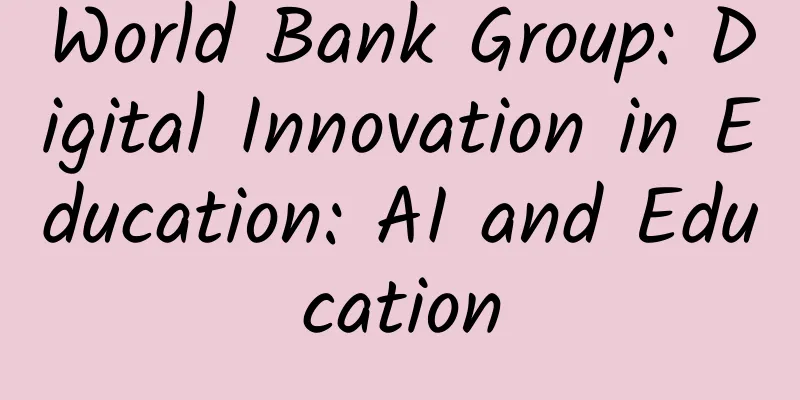World Bank Group: Digital Innovation in Education: AI and Education

|
The rapid development of artificial intelligence (AI) is disrupting the higher education landscape, bringing both opportunities and challenges to higher education. The report analyzes the results of focus group discussions conducted in 10 countries, examining students' views, experiences and concerns about the impact of AI on education. The report consists of three parts. Part I provides a general background on the impact of AI on higher education, the labor market, youth, and AI. Through a comprehensive review of emerging evidence, it explores the key role that higher education institutions (HEIs) should play in developing AI talent, preparing students for an AI-driven workforce, and developing research and policy around the societal impacts of AI. Through tools such as AI-assisted grading, adaptive learning systems, and automated data analysis, AI offers avenues to enhance teaching, learning, management, and decision-making. However, integrating AI also requires revisiting academic programs, strengthening technical infrastructure, addressing ethical risks around privacy and bias, and fostering unique human skills such as critical thinking that AI cannot easily replicate. Achieving AI readiness requires institutional changes such as improving the skills of educators, developing governance frameworks, ensuring equitable access to AI resources, and fostering a culture of innovation to responsibly harness the full potential of AI. The second part of the report discusses key findings about students’ perceptions, uses, and concerns about AI. The study shows that while students frequently use AI tools for academic purposes such as writing, coding, and creative projects, barriers such as high internet costs and low connectivity remain in some areas. In addition, students recognize the potential of AI to enhance learning through personalized feedback and accelerated skill acquisition. However, many learners expressed concerns that over-reliance on technology could stifle critical thinking. Their perceptions of emerging AI career paths varied, but what they had in common was an acknowledgement that current higher education courses are inadequately prepared, suggesting a need for specialized AI training. Part III offers reflections and recommendations for strengthening AI readiness and fluency in higher education. To responsibly harness the transformative potential of AI, governments must support safe, responsible, and human-centered policies, as well as public awareness initiatives, research funding, and the inclusion of AI in educational accreditation frameworks. Higher education institutions should actively reflect on teaching methods, curricula relevant to the changing job market, administrative governance models, and equitable access to technology.
|
>>: For the used car market, how much impact can the entry of the giant Xianyu cause?
Recommend
Alipay, don’t panic, WeChat mini-programs can’t get ahead of you
This is also the question that people have asked ...
Gained 30,000 followers in 7 days at no cost, the growth history of a Douyin newbie!
What if you want to gain 1 million followers in 7...
How to promote app brand from basic content, SEO, new media, PR drafts, and activities?
In life, we often encounter a scenario: for examp...
Will Russia launch a new type of nuclear weapon? What exactly is an anti-satellite satellite?
Any weapon that can destroy satellites on a large...
The collision between the prophet and the pioneer: Kevin Kelly's trend interpretation coincides with Suning's transformation practice
Who says the future is unpredictable? As early as...
Douyin promotion: Douyin traffic pool brings goods, and the business of Internet celebrities is really good
After becoming a super user traffic pool, it is n...
The "cooked cakes" sold by Wu Dalang were not sesame cakes! But maybe... steamed buns?
Everyone knows that Wu Dalang from Qinghe County,...
Weilai CEO Li Bin: Only 4% of trips exceed 100 kilometers, and electric vehicles are absolutely sufficient for daily use
Recently, at the 18th Annual Conference of Chines...
How to write the copy for Double Eleven? The heart is here!
The annual grand festival is coming I guess every...
Android source code download: My Gesture Lock
Functional classification: Tools Supported platfo...
Electric Technology Car News: Low price and high enjoyment, can the Vision X1 gain a firm foothold in the small SUV market?
Do you remember your first car? At that time, we ...
User growth: How to build an analysis system?
In the world of the Internet , everything is for ...
What is a polygenic risk score? Will “scientific fortune-telling” be possible in the future?
Although it is already 2022, it is still a common...
ZUK Z2 Pro won nine world firsts. Yang Yuanqing: I made the most correct decision
Yesterday, Jia Yueting just released LeEco's ...









